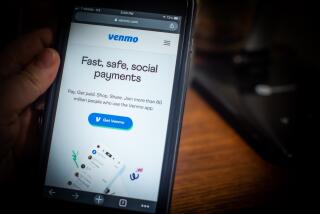Consumers Union questions safety of paying with smart phones
- Share via
Paying for a shopping spree by waving a smart phone may be more exciting than swiping a credit card, but according to Consumers Union, it might not be as safe.
The nonprofit testing and information organization, which publishes Consumer Reports, called on regulators Tuesday to implement protective standards on mobile payments.
Federal law currently shields credit or debit card holders from many charges associated with lost, stolen or misused cards. But without industry-wide rules for “digital wallet” providers, consumers could risk losing money through fraud, merchant disputes or processing mistakes, the group said.
Existing regulations are piecemeal, said the Yonkers, N.Y., group. Mobile payments linked to credit cards are the most protected, with limited liability for unauthorized transactions and the right to argue about certain charges.
Phone purchases hooked up to debit cards have fewer safeguards. But mobile payments would probably increase the number of charges funneled through prepaid cards and phone bills, which are even less protected.
While mobile payments are already common in countries such as Japan, they’re just now catching on in the U.S. Some critics have raised privacy and hacking concerns.
Bank of America Corp. and Visa Inc. are running a test program in New York starting in September. Customers would install small chips that emit short-distance radio waves into their smart phones, transmitting bank account data when waved near checkout points in stores.
Square, created by Twitter Inc. mastermind Jack Dorsey, uses a small plastic attachment and software downloaded onto some phones to allow anyone to accept credit card payments. PayPal Mobile has an app that allows money to be transferred by bumping smart phones together.
tiffany.hsu@latimes.com







